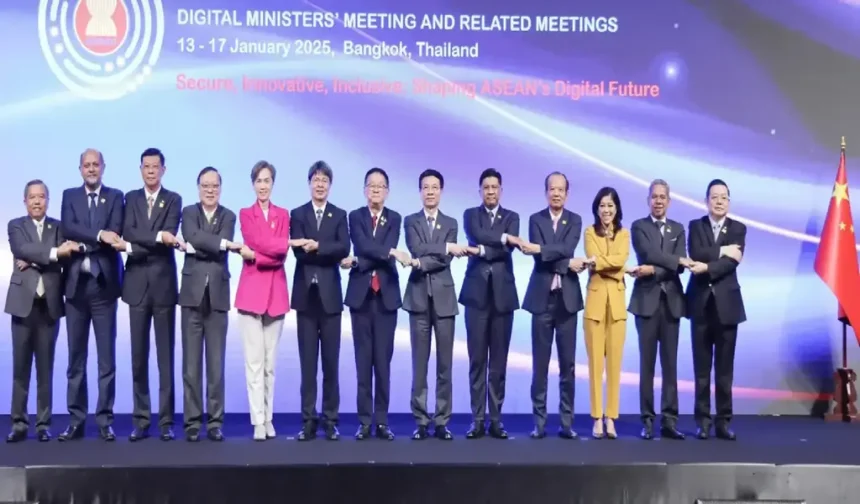The nations of the Association of Southeast Asian Nations (ASEAN) have signed a declaration to strengthen cooperation in preventing online scams, boosting regional investment in emerging technologies like AI, and facilitating the free flow of data throughout the region.
Last week in Bangkok, Thailand, the 5th ASEAN Digital Ministerial Meeting (ADGMIN-5) endorsed the Bangkok Digital Declaration.
The region has experienced a rise in the prevalence of cyber scams, including phone hoaxes and social media-based financial fraud. News reports have revealed that criminal organizations in Cambodia, Myanmar, and Laos are forcibly recruiting illegally trafficked individuals to work as scammers.
The U.S. Institute of Peace has estimated that criminal syndicates operating in Mekong countries presumably steal more than US$43.8 billion annually.
Last year, the ASEAN countries set up the ASEAN Regional Computer Emergency Response Team (CERT) in Singapore to share information about cyber incidents.
The delegates in Bangkok concluded that the ASEAN Norms Implementation Checklist could be used as a reference for regional initiatives to enhance cyber resilience.
The digital ministers endorsed the ASEAN Digital Economy Framework Agreement to enhance collaboration on cybersecurity and combat online scams. They also approved the Global CBPR Action Plan and the AI governance document, promoting responsible AI development across the region.
Key partners such as the United States, China, Japan, South Korea, India, and the International Telecommunication Union (ITU) also participated in the negotiations of the Bangkok Digital Declaration.
In addition to enhancing cybersecurity collaboration, the Bangkok Declaration commits to promoting digital innovation by promoting regional investment in research and development and assuring inclusive digital infrastructure.
During the meeting last Thursday, Indonesian Communication and Digital Minister Meutya Hafid stated, “Indonesia fully supports the measures in the Bangkok Digital Declaration, which are in line with our vision to support technological innovation and enhance digital inclusion.”
Radio Indonesia Republik reports that the Minister discussed child protection policies in the digital world with other ministers during the meetings in Bangkok. Last week, the Indonesian government initiated discussions on a dedicated law for protecting children online, similar to Australia’s proposal to establish a minimum age for social media users.
According to the Ministry of Digital, Malaysia has suffered a loss of US$700 million due to online schemes that affected over 95,800 victims between 2021 and April 2024.
According to TS Wong, the Group Managing Director of MyEG, Malaysia’s e-government service provider, interoperable digital IDs are essential for ASEAN due to the verification procedures.
At the ADGMIN-5 conference in Bangkok last week, Wong highlighted the importance of digital IDs in combating cybercrime.
“National Digital IDs are either in the process of being issued or have been issued by numerous countries that are participating in the forum, such as China, Malaysia, Singapore, and Thailand,” states Wong.
“It is feasible to accurately identify online users, irrespective of the degree of realism in deepfake videos, if countries acknowledge and facilitate localized verification of each other’s digital IDs in real-time.”
Zetrix, developed by MyEG, is a blockchain platform. Its ZCert is the inaugural verifiable credentials platform, collaborating with China’s national blockchain, Xinghuo BIF, to allow Chinese nationals to digitally confirm their identities abroad.
In 2025, Malaysia will assume the ASEAN chairmanship.
At the same time, the nation is hosting the Asia International Security Summit and Expo 2025 (AISSE25). According to The Edge Malaysia, Deputy Prime Minister Ahmad Zahid Hamidi proposed creating a national blockchain-based identity verification system at the event. This initiative aims to safeguard online transactions and reduce identity fraud.
Zahdi also proposed creating a cybercrime task force for ASEAN, similar to Interpol. He noted that the swift growth of the digital economy requires flexible security frameworks, as cyber criminals are using AI, automation, and the dark web to launch advanced attacks.
The Minister urges all stakeholders, including governments, law enforcement agencies, and industry leaders, to implement concrete measures in critical areas. “To proactively detect and prevent security threats, we must first implement AI-driven predictive policing and real-time urban surveillance.”
He emphasizes that maintaining a fair and just global security framework requires balancing strong security measures with respecting civil liberties.
Vietnam strongly promoted the adoption of open technologies at ADGMIN-5, with an emphasis on open-source AI and 5G Open RAN.
The Minister of Information and Communication, Nguyen Manh Hung, emphasized the need to regulate service providers and digital platforms and underscored the need for citizens to enhance their digital skills to combat online fraud effectively.
ASEAN’s Vision for Inclusive Digital Infrastructure and Innovation
The nation introduced mandatory biometric authentication in its banking sector last year to combat fraud. The State Bank of Vietnam (SBV) reported that biometric data has verified over 84.7 million accounts. However, not all institutions are complying with the mandate.
While domestic banks have adopted the new biometric rule, some foreign banks, such as HSBC in Hong Kong and UOB in Singapore, have still not complied, even though the deadline of January 1st has already passed.
Vietnam Investment View reports that the delay stems from various foreign institutions adopting multiple security layers, resulting in a decrease in fraud. However, this does not guarantee that banks are shielded from administrative penalties.
Pham Anh Tuan, director of the Payment Department at SBV, stated that foreign banks which fail to meet the verification requirements must suspend their services for consumers until they adhere to SBV regulations.
HSBC Vietnam stated that they are taking necessary steps to implement biometric verification as mandated while ensuring online banking transactions’ stability and security.
Banks must start collecting biometric data from corporate clients to reduce the risk of money laundering and fraud. According to a notice from Vietcombank, an organization’s legal representative must update their biometric information by July 1, 2025.
“Vietcombank will suspend the transfer and withdrawal services on the client’s electronic banking account if the client fails to update after this period,” the bank states.

Salman Ahmad is known for his significant contributions to esteemed publications like the Times of India and the Express Tribune. Salman has carved a niche as a freelance journalist, combining thorough research with engaging reporting.














